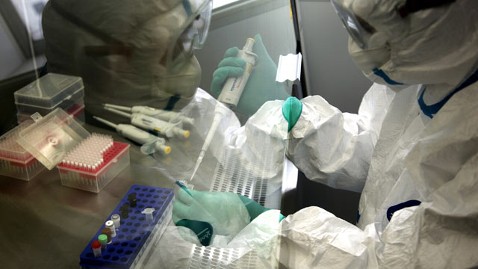Bird Flu Deaths Prompt Shanghai Poultry Slaughter

A technician deals with test reagents for H7N9 bird flu virus at the Quzhou Center for Disease Control (CDC), April 4, 2013, in Quzhou, China. (Credit: ChinaFotoPress/Getty Images)
The new bird flu strain in China has killed a sixth person and sickened eight others, officials announced Friday. The same day, a Shanghai market where the virus was detected in pigeons halted live bird sales and slaughtered all poultry.
More than 20,500 chickens, ducks, geese and pigeons were slaughtered, according to the Xinhua News Agency. The market is the first to temporarily close because of the outbreak.
"The key to control the number of H7N9 patients depends on whether the virus can spread among human beings," said Wu Fan, director of the Shanghai Municipal Center for Disease Control & Prevention at a press conference, according to Xinhua. "So far we haven't found any cases that show this kind of virus can spread from people to people."
American scientists are working on vaccine for the new bird flu, H7N9, according to the Centers for Disease Control and Prevention. The agency is also assessing the need for new tests to detect the virus, which experts say has mutated to infect mammals.
"All of these actions are routine preparedness measures taken whenever a new novel influenza virus is detected in humans," the CDC said on its website Thursday.
This is the first time avian influenza A viruses, also known as H7N9, have been detected in humans, according to the CDC. "This is an evolving situation and there is still much to learn," according to the agency.
The fifth victim of H7N9, a 48-year-old man from Shanghai, is believed to have had direct contact with fowl. His was the sixth confirmed bird flu case - and fourth death - in Shanghai, according Xinhua. The remaining cases were in Jiangsu, Zhejiang and Anhui.
The World Health Organization said the cases are not linked, but more than 400 close contacts of the infected patients are being monitored as a precaution.
"At this time there is no evidence of ongoing human-to-human transmission," the agency said.
ABC News' chief health and medical editor Dr. Richard Besser said the move by U.S. health officials to ready a vaccine and diagnostic test is a crucial step in preventing an outbreak.
"Whenever there is a new strain of influenza identified that can cause disease in humans, certain steps are taken as part of preparedness," he said. "A rapid response requires early preparedness."